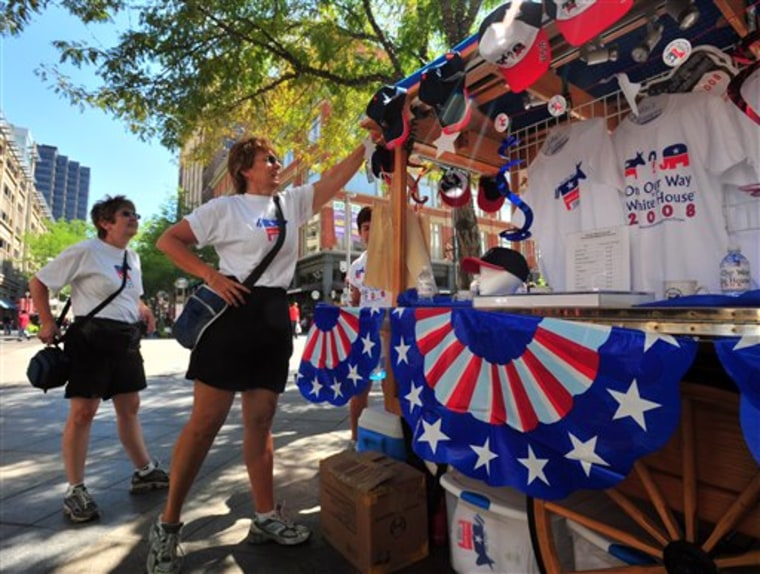Like a Cinderella deciding to pass up the ball, Denver said no thanks to an invitation in 1976 to host the Olympic Games. Now the Mile High City is off to the dance of the Democrats, a party pooper no more.
Nervous about the logistics, short on money, excited to show its sophisticated side, proud but a little touchy about its Western past, Denver is as ready as it's going to be for the Democratic National Convention.
Tens of thousands are expected for the Aug. 25-28 convention at the downtown Pepsi Center. An estimated 75,000 people could hear Barack Obama's acceptance speech at nearby Invesco Field at Mile High Stadium.
Denver is determined to drive home the Mountain West's importance in the presidential election and show off its stature as a cosmopolitan area of 2.4 million — one riding an oil and gas boom and strong in telecommunications, aerospace, agriculture and renewable energy.
City and party host committees have spent months urging Coloradans to get involved. More than 25,000 volunteers have responded in a burst of civic pride, and the city faces the prospect of young Obama supporters gathering in a kind of political Woodstock.
There have been hitches.
Owing to the protracted Democratic primary race and a dearth of Fortune 500 companies here, Denver fell nearly $12 million short of the $40.6 million it had pledged as its share of fundraising costs. Obama's vast money machine is coming to the rescue.
Money was part of what sank the hopes of Olympic boosters in 1976 and sent the games to Austria. Colorado voters blocked public money for the Olympiad, opposing not just the expense but the risk of environmental damage from bringing the mega-event to the state.
This time, 24 welcome parties across the city for delegates were consolidated into one event to reduce costs.
In a state unfriendly to organized labor, city leaders were able to settle union concerns about the convention. Union workers are being hired for the event at the Pepsi Center, a nonunion site. Democrats pay careful attention to whether venues they want to use are friendly to their union allies.
Colorado has a history of feeling overlooked, a problem dating to 1867, when the Union Pacific Railroad bypassed the area for an easier route across the Wyoming prairie. Denver was forced to build a spur to Wyoming, leaving residents steamed about being treated as a cow town.
In 1876, Colorado became a state and burst onto the national political scene, casting the deciding votes when Republican Rutherford B. Hayes won the Electoral College by one vote.
In 1908, Denver held the Democratic convention, which nominated William Jennings Bryan by acclamation before he lost his third bid for the presidency to William Howard Taft.
Part Wild West, part business capital of the Rocky Mountain region, the city had big banks as well as Market Street bordellos, 210,000 people, street cars and a sense its fortunes were on the rise.
Damon Runyon, writing for the Rocky Mountain News before making a splash in New York, noted that suits and straw hats were more common among men in downtown Denver than boots and cowboy hats.
Still, organizers held a rodeo and hired Apaches to camp at City Park.
This year, suggestions that delegates be welcomed at a rodeo were brushed aside; an amusement park was chosen instead. The cow town rap still infuses local sensibilities.
From 1921 to 1925, the Ku Klux Klan dominated Denver politics, including the governor's office and a U.S. Senate seat. Ben Stapleton became mayor with Klan support but later repudiated the organization. The issue still burns decades later, with a movement to erase his name from housing projects built on the site of former Stapleton International Airport.
In the 1940s, Gov. Ralph Carr gained national attention for standing up for Japanese-Americans who were interned during World War II.
Democrats say a big reason they picked Colorado over New York for this year's convention is the opportunity they see in the Mountain West.
In 2002, Democrats swept five Western Republican governors from office. In 2004 they added Montana, and in 2006 they won control of Colorado's statehouse and governor's office for the first time since 1962, along with a Senate seat. They could take another Senate seat this year; Republican Wayne Allard is retiring.
Still, the top prize has been elusive. Colorado has voted for a Democratic presidential candidate only three times in more than a half-century: Harry Truman in 1948, Lyndon B. Johnson in 1964 and Bill Clinton in 1992.
Holding the convention provides no guarantees. Howard Dean, chairman of the Democratic National Committee, says Western voters want politicians to focus on bipartisan collaboration and honesty. Colorado, for one, is more libertarian than Democratic.
The Libertarian Party was founded in Colorado Springs, and that city remains a conservative bastion, home to James Dobson and Focus on the Family. Democrats reign in Denver and Boulder. But Republican and independent voters both outnumber Democrats in Colorado.
For all the emphasis on Denver's futuristic endeavors, it's worth keeping in mind that cows — yes, cows — are still a big draw, bigger than Democrats.
The National Western Stock Show, which brings ranchers and farmers together to show off their livestock and strike stockyard deals, packs in nearly 10 times more people than are expected to hear Obama's acceptance speech.
The stock show's attendance this year: nearly 674,000.
